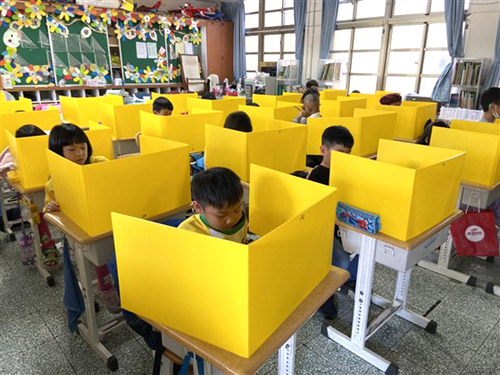by WorldTribune Staff, March 12, 2020
The island nation of Taiwan has just 47 confirmed cases of coronavirus despite its close proximity to China, Japan and South Korea, three countries with some of the world’s worst outbreaks of the Wuhan virus.
As news of the new virus was breaking, Taiwan’s government introduced a travel ban on visitors from China, Hong Kong and Macau. Additionally, the government implemented a ban on exporting surgical masks, ensuring a stockpile in Taiwan.

Taiwanese health officials “saw the virus taking shape in the central Chinese Wuhan in December and began checking passengers who flew in from there. They also cut off flights from much of China, the outbreak origin, before a lot of peers around Asia did,” Voice of American (VOA) reported.
Action against the coronavirus boosted President Tsai Ing-wen’s approval rating to 68.5 percent in February, up from 56.7 percent in January, a Taiwanese Public Opinion Foundation poll showed.
Related: Over 1 million South Koreans sign petition to impeach their president over handling of virus, February 27, 2020
Almost every public building in Taipei offers hand sanitizer. Schools require that anyone entering submit to a fever check. Taiwan’s Centers for Disease Control announces any new cases every day. In February it began rationing facemask purchases to head off panic buying.
“With the hit from Wuhan pneumonia, most people originally figured Taiwan was going to be miserable this time because ties with mainland China are so close, and that it couldn’t be avoided,” said You Ying-lung, chairman of the Taiwanese Public Opinion Foundation polling agency, using a local term for the disease officially dubbed COVID-19.
“But as the things became clear, it turned out Taiwan wasn’t so miserable and in fact compared to other countries in the world, it’s got the best performance,” he said.
Taiwan has been blocked by China from re-joining the World Health Organization (WHO). But that hasn’t stopped Taiwan from successfully limiting the spread of coronavirus, and assisting other nations by sharing prevention strategies.
“Taiwan has shared information with other countries “through teleconferences, while helping countries that lack advanced medical capabilities to process samples from patients,” said Dr. Jason Wang, a public health policy expert at Stanford University. “In other words, the Taiwanese government has been actively using the topic of public health to engage with other countries.”
“The WHO should know that inclusiveness is the key to combating a global pandemic, and if it is ignoring certain pockets in the world, then that is not good,” Wang added.
Taiwan’s Centers for Disease Control started onboard quarantine of all direct flights from Wuhan on Dec. 31. The centers said on its website that by Jan. 9 it had “inspected” 14 flights with 1,317 passengers and attendants.
Officials in Taiwan took a “more proactive” approach compared to other parts of Asia by stopping flights from China, lawmaker Lo Chih-cheng said. Hundreds of thousands of Taiwanese live in China and a lot of them return in the first two months of each year for holidays, a pattern that increased Taiwan’s exposure to the disease.
The Centers for Disease Control’s daily announcements include details on how new patients might have gotten sick and whether anyone else might be infected. The island’s only death attributed to coronavirus was described as a taxi driver in his 60s with two existing medical conditions.
Taiwanese citizens, Lo said, consider transparency “very important.”
Taiwanese officials said they also moved fast because of the island nation’s experience 17 years ago with SARS, or severe acute respiratory syndrome. That disease originated in China and jumped into other parts of Asia. It killed 73 people in Taiwan.
Officials are looking for ways now to minimize economic impacts of the virus.
“The ultimate impact of course includes that Taiwan’s GDP growth will definitely go down, because Taiwan’s GDP is very connected to China’s economy,” said Huang Kwei-bo, vice dean of the international affairs college at National Chengchi University in Taipei.
Parliament approved a $1.96 billion stimulus package last month for companies shaken by the outbreak, the VOA report noted.
After the virus subsides, Lo said, the government will come out with discount vouchers to encourage spending. More might be in the pipeline.
“We need to do something to help the small and medium-sized enterprises to pass through this kind of difficult period,” Lo said. “The government for example needs to lower the interest rates and to help the people or the companies, or factories, to borrow new loans from the bank, so this is the first stage.”
Intelligence Brief __________ Replace The Media
